Winery Landgraf
"Through the sustainable and quality-conscious nature of organic farming, we work in harmony with nature, increase the fertility of the soil and preserve the natural aroma of the grapes. After all, our passion is still for the traditional wine-growing trade, which gives rise to the characteristic Landgraf wines with their subtle nuances. "- this is the credo. Eichelmann 2013: 3.5 stars - "newcomer of the year". "In Andre Landgraf everything is right and it goes steadily ahead: The estate wines are clear and fruity, the local wines powerful, the vineyard wines have substance and structure." Gault Millau - 2 red grapes.
English speaking guests are welcome.








